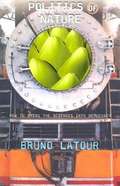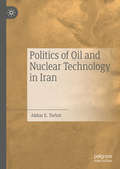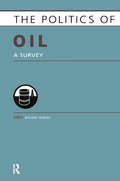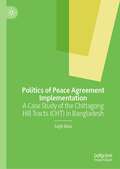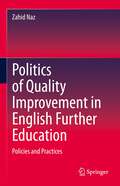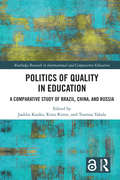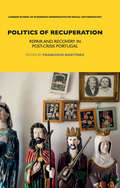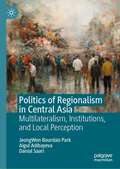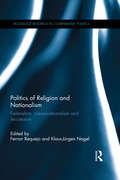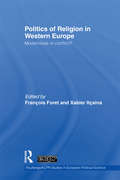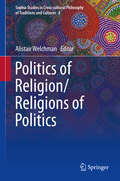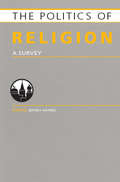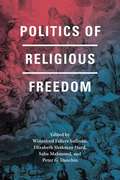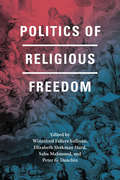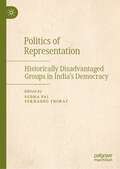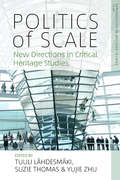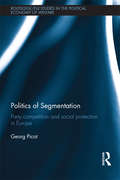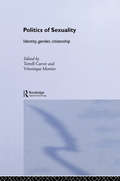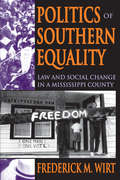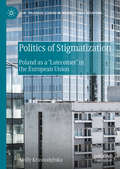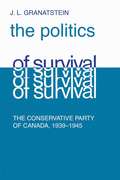- Table View
- List View
Politics of Nature: How to Bring the Sciences into Democracy
by Bruno Latour Catherine PorterA major work by one of the more innovative thinkers of our time, Politics of Nature does nothing less than establish the conceptual context for political ecology--transplanting the terms of ecology into more fertile philosophical soil than its proponents have thus far envisioned. Bruno Latour announces his project dramatically: "Political ecology has nothing whatsoever to do with nature, this jumble of Greek philosophy, French Cartesianism and American parks. " Nature, he asserts, far from being an obvious domain of reality, is a way of assembling political order without due process. Thus, his book proposes an end to the old dichotomy between nature and society--and the constitution, in its place, of a collective, a community incorporating humans and nonhumans and building on the experiences of the sciences as they are actually practiced. In a critique of the distinction between fact and value, Latour suggests a redescription of the type of political philosophy implicated in such a "commonsense" division--which here reveals itself as distinctly uncommonsensical and in fact fatal to democracy and to a healthy development of the sciences. Moving beyond the modernist institutions of "mononaturalism" and "multiculturalism," Latour develops the idea of "multinaturalism," a complex collectivity determined not by outside experts claiming absolute reason but by "diplomats" who are flexible and open to experimentation.
Politics of Oil and Nuclear Technology in Iran
by Akbar E. TorbatThis book focuses on oil politics and the development of nuclear technology in Iran, providing a broader historical context to understand Iran’s foreign relations and nuclear policy. The author assesses Iran's encounters with the West in light of major confrontations both in terms of open conflict as well as controversies surrounding treaties with foreign powers. In seeking to understand the geopolitics of oil in direct parallel to the geopolitics of nuclear technology, the book concentrates on Iran’s struggles to nationalize its oil, neo-colonialism, the formation of the oil consortium, and the more recent US backtracking on the nuclear deal with Iran.
Politics of Oil: A Survey
by Bülent GökayThis new title presents key information on the oil industry world-wide, and will be of interest to anyone involved in or studying the politics of oil production, processing and selling. Oil has long been at the forefront of political agendas, and with increased tensions in the Middle East, there has never been a greater need for up-to-date, reliable information on this key industry. Includes: * essays covering the main themes * an A-Z glossary listing important terms * detailed maps * a statistics section.
Politics of Peace Agreement Implementation: A Case Study of the Chittagong Hill Tracts (CHT) in Bangladesh
by Sajib BalaAnalyses why is it that the different actors hold different views about the CHT Peace Agreement and the question of its implementation Is based on a qualitative research study using methodological triangulation of both primary and secondary data Scrutinises the underlying facts regarding the implementation politics (or interest) of the CHT Peace Agreement
Politics of Post-Civil Society
by Ajay GudavarthyCivil Society has emerged as one of the most celebrated concept of the twentieth and the twenty-first centuries. It offers practices that are the means and certain normative ideals that are the ends to be achieved for the preservation of democracy and expansion of the process of democratization. When available practices fail, reasons have been sought in the ideals being too lofty, and when the ideals looked minimalist, the blame has been shifted to the nature of practices being free-floating and bereft of definitive borders. Politics of Post-Civil Society is an attempt to map the discourse and politics of contemporary political movements in India that have been negotiating with the hegemonic effects born out of the insidious co-habitation of political principles and practices in the domain referred to as the civil society. In course of constructing the political landscape of these movements, the book foregrounds the various strategies through which they are pushing and nudging towards a new politics of post-civil society.
Politics of Preference: India, United States, and South Africa (Public Administration and Public Policy)
by Ph.D, Krishna TummalaMinorities, based on whatever criteria linguistic, religious, ethnic, tribal, racial, or otherwise‘share a distinctive contextual and social experience. Their representation in public service is important, especially when there have been public policies which have historically discriminated against them. Politics of Preference: India, United States
Politics of Public Money, Second Edition
by David A. GoodPublic money is one of the primary currencies of influence for politicians and public servants. It affects the standards by which they undertake the nation's business and impacts the standard of living of the nation's citizens. David A. Good's The Politics of Public Money examines the extent to which the Canadian federal budgetary process is shifting from one based on a bilateral relationship between departmental spenders and central guardians to one based on a more complex, multilateral relationship involving a variety of players.This new edition offers an up-to-date account of the Canadian system, including the creation of the Parliamentary Budget Officer, the government's response to the global financial crisis, Canada's Economic Action Plan, strategic and operating reviews, the most recent attempts to reform the Estimates, and much more.An insightful and incisive study of the changing budgetary process, The Politics of Public Money examines the promises and pitfalls of budgetary reform and sheds new light on the role insiders play in influencing government spending.
Politics of Quality Improvement in English Further Education: Policies and Practices
by Zahid NazThis book offers a rich account of how quality improvement agendas, informed by neoliberalism, create contradictory and complex contexts in which teachers produce different types of practices for specific purposes. Drawing on Michel Foucault’s analytical tools, archaeology and genealogy, this book weaves together findings from classroom observations, field notes and interviews to explore the dichotomies between practices focussing on day-to-day pedagogies and practices concerned with performance management and accountability initiatives. By attending to a Foucauldian conception of power and counter conduct, it explores new means of defining quality in teaching spaces. After considering existing quality assurance judgements, the book illuminates the significance of moving slightly away from an institutionalised enterprise culture and loosing relations with reductionist approaches as a starting point. While doing so, it reworks the idea of quality by presenting other ways of looking at the complex character of pedagogical real(s) with new insights into an emergentist and process-oriented conception of teaching practices. The book argues that we need to unlearn our existing knowledge of quality that overlooks contextual constraints and opportunities enmeshed in teaching practices. It questions the assumptions that the existing methods of observation are capable of quantifying the quality of education in a classroom or in a college in toto. By introducing the idea of documentisation, the book breaks new theoretical ground to show that this so-called system of robust accountabilities is not as self-evident as we believe and why we must rethink quality by unthinking our current common sense. Written for researchers in educational studies, practising teachers and policy makers, this book combines profound insights from theory and contemporary teaching practices with clear guidelines as to how educational policy making should be approached.
Politics of Quality in Education: A Comparative Study of Brazil, China, and Russia (Routledge Research in International and Comparative Education)
by Jaakko Kauko Risto Rinne Tuomas TakalaThe question of quality has become one of the most important framing factors in education and has been of growing interest to international organisations and national policymakers for decades. Politics of Quality in Education focuses on Brazil, China, and Russia, part of the so-called emerging nations’ BRICS block, and draws on a four-year project to develop a new theoretical and methodological approach. The book builds a comparative, sociohistorical, and transnational understanding of political relations in education, with a particular focus on the policies and practices of Quality Assurance and Evaluation (QAE). Tracking QAE processes from international organisations to individual schools, contributors analyse how QAE changes the dynamics in the roles of state, expertise, and governance. The book demonstrates how national and sub-national actors play a central role in the adaptation, modification or rejection of transnational policies. Politics of Quality in Education will be of great interest to academics, researchers and postgraduate students engaged in the study of comparative and international education, as well as educational policy and politics. It should also be essential reading for practitioners and policymakers. The Open Access version of this book, available at https://www.taylorfrancis.com/books/e/9781351362528, has been made available under a Creative Commons Attribution-Non Commercial-No Derivatives 4.0 license.
Politics of Race
by Annette Isaac Jill VickersThe Politics of Race is an excellent resource for students and general readers seeking to learn about race policies and legislation. Arguing that 'states make race,' it provides a unique comparison of the development and construction of race in three white settler societies -- Canada, the United States, and Australia.This timely new edition focuses on the politics of race after 9/11 and Barack Obama's election as president of the United States. Jill Vickers and Annette Isaac explore how state-sanctioned race discrimination has intensified in the wake of heightened security. It also explains the new race formation of Islamophobia in all three countries, and the shifts in how Hispanics and Asian Americans are being treated in the United States. As race and politics become increasingly intertwined in both academic and popular discourse, The Politics of Race aids readers in evaluating different approaches for promoting racial justice and transforming states.
Politics of Recuperation: Repair and Recovery in Post-Crisis Portugal (LSE Monographs on Social Anthropology)
by Francisco MartínezThrough a range of ethnographic case studies focusing on the Portuguese recovery after the economic crisis, this book begins a conversation about the experience of recuperation and repair. Located in the cracks and gaps between the state and society, recuperation appears as a social and infrastructural answer linked to reciprocity, critical urbanity, generational interweaving, alternate ordering and reconnection of different bodies and histories. With chapters looking at public art in Lisbon and recuperative modes of action, this collection takes a thorough look at a society in crisis and shows how the people of the community create micro-politics of resistance. Ultimately, Politics of Recuperation reflects on the meaning of personal and collective resilience in Europe today, as well as on the limits and interstices of contemporary politics.
Politics of Regionalism in Central Asia: Multilateralism, Institutions, and Local Perception
by JeongWon BOURDAIS PARK Aigul ADIBAYEVA Danial SAARIThis book addresses how to mitigate regional tensions and enhance cooperative opportunities through well-designed regional institutions and organizations among countries in geographical proximity. We use the case of Central Asia (i.e., Kazakhstan, Kyrgyzstan, Tajikistan, Turkmenistan, and Uzbekistan) to employ our conceptual framework of ‘externally guided regionalism.’ The following questions guide the study: How and by what forces has Central Asian regionalism evolved, and what are the main characteristics and political implications of the continuously evolving regional institutions? We discuss not only the extra-regional influential actors (i.e., Russia, the United States, the European Union, and China), but also intra-regional initiatives, strategies, and struggles in securing stability and sovereignty. Extra-regional actors’ growing competition over molding their own kind of multilateralism involving this region has contributed to the current direction of Central Asia’s regionalization. Concurrently, Central Asia’s political conditions and constraints interactively contribute to ever-increasing institutional sprawl.
Politics of Religion and Nationalism: Federalism, Consociationalism and Seccession (Routledge Research in Comparative Politics)
by Ferran Requejo Klaus-Jürgen NagelThere are numerous examples of how religion and nationalism intertwine. In some cases, a common religion is the fundamental marker of a nation’s identity, whereas in others secular nationalism tries to hold together people of different religious beliefs. This book examines the link between religion and nationalism in contemporary polities. By exploring case studies on India, Russia, Israel, Canada, Chechnya, Bosnia-Herzegovina, Belgium, Northern Ireland, Scotland, Sri Lanka, Catalonia and the Basque Country, it seeks to understand the relationship between these two key societal forms of diversity and assess the interaction between religious and nationalist perspectives. Expert contributors examine a variety of phenomena, including secular nationalism, secessionism, and polities in which religious pluralism is evolving. This book will be of interest to students and scholars of political science, religion and politics, nationalism, federalism, secession, political philosophy, racial and ethnic politics and comparative politics.
Politics of Religion in Western Europe: Modernities in conflict? (Routledge/ECPR Studies in European Political Science)
by François Foret Xabier ItçainaReligion is becoming increasingly important to the study of political science and to re-examine key concepts, such as democracy, securitization, foreign policy analysis, and international relations. The secularization of Europe is often understood according to the concept of ‘multiple modernities’—the idea that there may be several roads to modernity, which do not all mean the eradication of religion. This framework provides support for the view that different traditions, societies and groups can come to terms with the components of modernity (capitalism, democracy, human rights, science and reason) while keeping in touch with their religious background, faith and practice. Contributors examine the interaction between EU-integration processes and Western European countries, such as Belgium, France, Luxembourg, Austria, Scandinavia, Italy, and the UK, and shine fresh light on the economic and cultural contexts brought about by relationships between politics and religion, including immigrant religions and new religious movements. This volume combines theoretical perspectives from political sociology and international relations to consider the role of religion as a source of power, identity and ethics in institutions and societies. Politics of Religion in Western Europe will be of interest to scholars of politics, religion, the European Union and political sociology.
Politics of Religion/Religions of Politics
by Alistair WelchmanThe liberal enlightenment as well as the more radical left have both traditionally opposed religion as a reactionary force in politics, a view culminating in an identification of the politics of religion as fundamentalist theocracy. But recently a number of thinkers--Agamben, Badiou, Tabues and in particular Simon Critchley--have begun to explore a more productive engagement of the religious and the political in which religion features as a possible or even necessary form of human emancipation. The papers in this collection, deriving from a workshop held on and with Simon Critchley at the University of Texas at San Antonio in February 2010, take up the ways in which religion's encounter with politics transforms not only politics but also religion itself, molding it into various religions of politics, including not just heretical religious metaphysics, but also what Critchley describes as non-metaphysical religion, the faith of the faithless. Starting from Critchley's own genealogy of Pauline faith, the articles in this collection explore and defend some of the religions of politics and their implications. Costica Bradatan teases out the implications of Critchley's substitution of humor for tragedy as the vehicle for the minimal self-distancing required for any politics. Jill Stauffer compares Critchley's non-metaphysical religiosity with Charles Taylor's account of Christianity. Alistair Welchman unpacks the political theology of the border in terms of god's timeless act of creation. Anne O'Byrne explores the subtle dialectic between mores and morality in Rousseau's political ethics. Roland Champagne sees a kind non-metaphysical religion in Arendt's category of the political pariah. Davide Panagia presents Critchley's ethics of exposure as the basis for a non-metaphysical political bond. Philip Quadrio wonders about the political ramifications of Critchley's own 'mystical anarchism' and Tina Chanter re-reads the primal site in the Western tradition at which the political and the religious intersect, the Antigone story, side-stepping philosophical interpretations of the story (dominated by Hegel's reading) by means of a series of post-colonial re-imaginings of the play. The collection concludes with an interview with Simon Critchley taking up the themes of the workshop in the light of more recent political events: the Arab Spring and the rise and fall of the Occupy movement.
Politics of Religion: A Survey
This title explores some of the key issues which surround the politics of religion, an area which has historically been the cause of great controversy. Today religion is still the cause of a great deal of political debate, be it the teaching of the creationist theory in the United States or the relationship of church and state in Arabic countries. Four sections present a thorough overview of the politics of religion in historical perspective: Essay chapters written by a variety of academic and other experts on the major world religions and their relationship with politics, and on topics including religious fundamentalism, church and state and religious terrorism, providing background analysis of the links between religion and politics. A – Z glossary of religions, religious groups, ideas and issues, including entries on Agnosticism, Bradford Council of Mosques, Muslim Brotherhood, Nirvana, the World Council of Churches, etc. Entries are up-to-date and cross referenced for ease of use, and symbols at the end of each entry denote to which major religion(s) the entry refers. Maps for reference, showing adherents to major religions worldwide, adherents to religions in the Middle East, and adherents to the major sub-types of Christianity. This title offers up-to-date and unbiased information that will provide a wealth of information to students, academics, business people and general researchers.
Politics of Religious Freedom
by Saba Mahmood Elizabeth Shakman Hurd Peter G. Danchin Winnifred Fallers SullivanIn a remarkably short period of time, the realization of religious freedom has achieved broad consensus as an indispensable condition for peace. Faced with widespread reports of religious persecution, public and private actors around the world have responded with laws and policies designed to promote freedom of religion. But what precisely is being promoted? What are the cultural and epistemological assumptions underlying this response, and what forms of politics are enabled in the process? The fruits of the three-year Politics of Religious Freedom research project, the contributions to this volume unsettle the assumption--ubiquitous in policy circles--that religious freedom is a singular achievement, an easily understood state of affairs, and that the problem lies in its incomplete accomplishment. Taking a global perspective, the more than two dozen contributors delineate the different conceptions of religious freedom predominant in the world today, as well as their histories and social and political contexts. Together, the contributions make clear that the reasons for persecution are more varied and complex than is widely acknowledged, and that the indiscriminate promotion of a single legal and cultural tool meant to address conflict across a wide variety of cultures can have the perverse effect of exacerbating the problems that plague the communities cited as falling short.
Politics of Religious Freedom (South Atlantic Quarterly Ser. #Vol. 113)
by Saba Mahmood Elizabeth Shakman Hurd Peter G. Danchin Winnifred Fallers Sullivan, Elizabeth Shakman Hurd, Saba Mahmood, and Peter G. DanchinIn a remarkably short period of time, the realization of religious freedom has achieved broad consensus as an indispensable condition for peace. Faced with widespread reports of religious persecution, public and private actors around the world have responded with laws and policies designed to promote freedom of religion. But what precisely is being promoted? What are the cultural and epistemological assumptions underlying this response, and what forms of politics are enabled in the process? The fruits of the three-year Politics of Religious Freedom research project, the contributions to this volume unsettle the assumption—ubiquitous in policy circles—that religious freedom is a singular achievement, an easily understood state of affairs, and that the problem lies in its incomplete accomplishment. Taking a global perspective, the more than two dozen contributors delineate the different conceptions of religious freedom predominant in the world today, as well as their histories and social and political contexts. Together, the contributions make clear that the reasons for persecution are more varied and complex than is widely acknowledged, and that the indiscriminate promotion of a single legal and cultural tool meant to address conflict across a wide variety of cultures can have the perverse effect of exacerbating the problems that plague the communities cited as falling short.
Politics of Representation: Historically Disadvantaged Groups in India’s Democracy
by Sudha Pai Sukhadeo ThoratThe book presents debates around the concept of representation and how these ideas apply to representation for selected disadvantaged groups in India. It discusses empirical concerns and examines political representation of these disadvantaged groups in post-independence India. The experience of political representation of SCs, STs: the method of election, role of political parties in providing representation, role played by these groups in parliamentary institutions, and the extent of their participation. A second, significant area the volume attempts to cover is representation of the Muslim minority in parliament and state assemblies and understanding the reasons for their under-representation since independence, and more particularly in recent years.
Politics of Scale: New Directions in Critical Heritage Studies (Explorations in Heritage Studies #1)
by Suzie Thomas Tuuli Lähdesmäki Yujie ZhuCritical Heritage Studies is a new and fast-growing interdisciplinary field of study seeking to explore power relations involved in the production and meaning-making of cultural heritage. Politics of Scale offers a global, multi- and interdisciplinary point of view to the scaled nature of heritage, and provides a theoretical discussion on scale as a social construct and a method in Critical Heritage Studies. The international contributors provide examples and debates from a range of diverse countries, discuss how heritage and scale interact in current processes of heritage meaning-making, and explore heritage-scale relationship as a domain of politics.
Politics of Segmentation: Party Competition and Social Protection in Europe (Routledge Studies in the Political Economy of the Welfare State)
by Georg PicotWhen political parties make policy decisions they are influenced by the competition they face from other parties. This book examines how party competition and party systems affect reforms of social protection. Featuring a historical comparison of Italy and Germany post-1945, the book shows how a high number of parties and ideological polarisation lead to fragmented and unequal social benefits. Utilising a comparative approach, the author brings together two important issues in welfare state research that have been insufficiently investigated. Firstly, the complex influence of party competition on social policy-making, and second, how some social groups enjoy better social protection than others. Moving beyond the two countries of the case study, the book proposes an innovative framework for studying segmentation of social protection and applies this framework to a wider set of 15 advanced welfare states. Overall, this book draws together different strands of research on political parties and on welfare states, and introduces a new argument on how party politics shapes social policy. An invaluable text on the political economy of the welfare state, Politics of Segmentation will be of interest to scholars of political economy, social policy and comparative politics.
Politics of Sexuality: Identity, Gender, Citizenship (Routledge/ECPR Studies in European Political Science)
by Terrell Carver Véronique MottierThis book recognises sexuality as a mainstream concept in political analysis and explores issues in the politics of sexuality that are highly salient and controversial today. These include conceptions of citizenship and nationality linked to gender and sexuality, the legislation about the age of consent, prostitution and 'trafficing in women', the international politics of population control, abortion, sexual harrassment, and sexuality in the military. The international team of contributors provide a wide range of perspectives in a variety of contexts. On a national level they offer illustrative case studies from the UK, Ireland, the Netherlands, Spain and Israel among others, and on an international plane they cover the European Union, the UN Conference on Population and Development and the role of the Vatican as international arbiter. Moreover, the volume addresses the interaction between political discourse and the work of major theorists such as Weber, Freud, Foucault, Irigaray and Butler.
Politics of Southern Equality: Law and Social Change in a Mississippi County
by Frederick M. WirtThis path-breaking text deals with the effects of federal civil rights legislation on the behavior and attitudes of the inhabitants of a single county in Mississippi--Panola County. These effects are examined in the three civil rights areas of voting, education, and economic opportunities. By using this smaller example, Frederick M. Wirt's broader interest is to show how legislation can be used to effect social change on a large scale.The need to substitute empirical knowledge for abstract speculation motivates Wirt's study. Wirt restricts his study to one county but with conclusions on comparative studies that illumine the emerging political sociology of the South. The author sketches the historical setting of Panola County, emphasizing on the demographic, economic, and political developments in recent decades. He then examines what has actually happened in race relations as an effect of civil rights laws affecting votes, schools, and jobs.Wirt utilizes documentary material from federal, state, and county sources; local newspapers; and records from business and other groups. But his closer understanding comes from personal interviews. Because federal law is the dynamic factor setting the social system in movement, the author explains the interactions between public opinion, the President, and the Congress, which in the end resulted in the laws on votes, schools, and jobs. He also deals with the differing machinery of sanctions and enforcement. Law has a huge effect on social change; and Wirt draws from his empirical study a systematic, inclusive statement of the factors affecting compliance with law, in conditions of conventional biases.
Politics of Stigmatization: Poland as a ‘Latecomer’ in the European Union (Palgrave Studies in International Relations)
by Molly KrasnodębskaThis book studies how the pursuit of becoming an established ‘insider’ in an international community shapes a state’s foreign policy. It looks at Poland’s response to three international crises that called for joint action of the EU and its members: the Iraq war of 2003, the Russo-Georgian war of 2008, and the Ukraine crisis beginning in 2013. The book develops the concept of strategic culture as a collection of historically informed narratives that guide a state’s pursuit of ontological security, a basic sense of certainty about the state’s role and place in the international environment. Building on this concept the author argues that Poland’s behavior reflects the awareness of its stigma as a ‘late arrival’ in the EU, and more generally in the ‘West’ as an identity community. The study thus provides insight into how stigmatization and struggle for recognition shape international dynamics.
Politics of Survival: The Conservative Part of Canada, 1939-1945 (The Royal Society of Canada Special Publications)
by J. L. GranatsteinProfessor Granatstrin's book is a fascinating account of the Conservative party's struggle for survival during the Second World War. In some respects a new departure in Canadian history and with some startling parallels to present-day events and personalities in Canadian politics, it is the first full-length look at a major party during a critical period of our history. Lively writing and a wealth of documentation that has only recently become available help to make it one of the most interesting studies to be published in this field.
